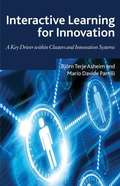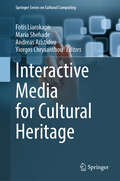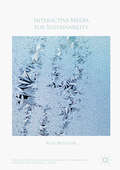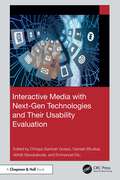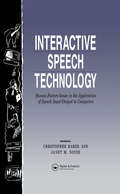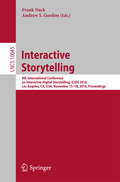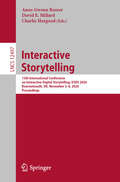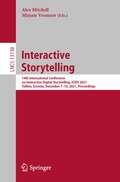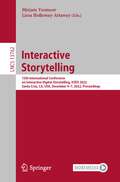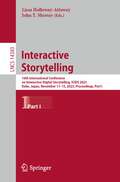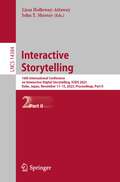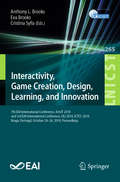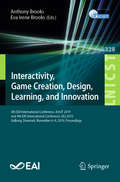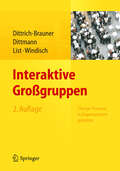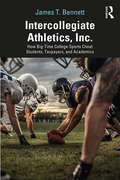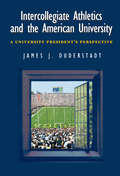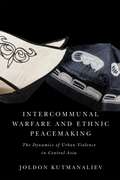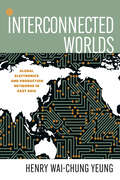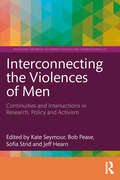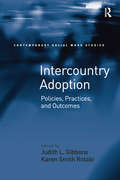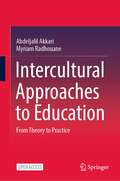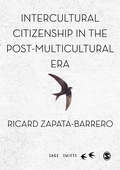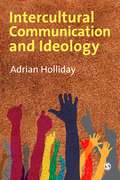- Table View
- List View
Interactive Learning for Innovation
by Bjørn T. Asheim Mario Davide ParrilliThis collection of essays challenges the traditional neoclassical approach to innovation and growth, focusing on interactive and experiential innovation, and reaffirming the importance of science and technology as a means of mutual strengthening. Through a detailed examination of the performanceof geographical areas of outstanding economic growth, this volume responds to the needs of economies with limited financial capacity for investment in standard knowledge-based inputs and human capital. Contributions instead emphasise the potential for innovation and development in practical and technological areas, providing valuable policy lessons for SME-based economies.
Interactive Media for Cultural Heritage (Springer Series on Cultural Computing)
by Fotis Liarokapis Maria Shehade Yiorgos Chrysanthou Andreas AristidouThe aim of this edited book is to provide a point of reference for the latest advancements in the different fields of interactive media applied in Digital Cultural Heritage research, ranging from visual data acquisition, classification, analysis and synthesis, 3D modelling and reconstruction, to new forms of interactive media presentation, visualization and immersive experience provision via extended reality, collaborative spaces, serious games and digital storytelling. This volume, is structured around 4 sections, focusing on different types of technologies and applications in Cultural Heritage, namely: Cutting-Edge Applications of Extended Reality in Cultural Heritage Preservation, Cultural Heritage Preservation and Exploration through Emerging Digital Technologies, Interactive and Immersive Experiences for Storytelling in Cultural Heritage and Innovative Approaches to Interactive Cultural Heritage Visualization. Interactive Media for Cultural Heritage consists of theoretical discussions and presents a range of case studies from diverse geographical locations allowing for an international focus of the book. It is addressed to academics, scholars, researchers, and students working on interactive media in cultural heritage and provides an interdisciplinary approach to enable cross-fertilization and collaboration among those research communities.
Interactive Media for Sustainability (Palgrave Studies in Media and Environmental Communication)
by Roy BendorInteractive Media for Sustainability presents a conceptually rich, critical account of the design and use of interactive technologies to engage the public with sustainability. Treating interactive technologies as forms of mediation, the book argues that these technologies advance multiple understandings of sustainability. At stake are the ways sustainability encodes the complexity of interrelated social and natural systems, and how it conveys the malleability of the future. The book’s argument is anchored in a diverse set of theoretical resources that include contemporary work in human-computer interaction (HCI), social theory, media studies, and the philosophy of technology, and is animated by a variety of examples, including interactive simulations, persuasive apps, digital games, art installations, and decision-support tools.
Interactive Media with Next-Gen Technologies and Their Usability Evaluation
by Emmanuel Eilu Ganesh Bhutkar Chhaya Santosh Gosavi Abhijit BanubakodeInteractive media are a human-machine interface that allows people to connect with each other by making them active participants in the media they consume through text, graphics, audio and video. This book presents the challenges and opportunities presented by emerging media technologies to explore usability evaluation. It covers the current trends in interactive media technologies such as, Social Media, Dark Patterns, Internet of Things (IoT), Android Development, Assistive Technologies and Augmented Reality (AR) / Virtual Reality (VR). It explores various application areas such Education, Film and Television, Agriculture, Cyber Security, Bird Conservation, Smart Vehicles, Fashion Technology and e-Learning.Key features of this edited book are as follows:● Evaluates related Interactive Media Technologies and Applications for assessment and enhancement of their usability● Illustrates current discussions on Interactive Media Technologies such as Social Media, Dark Patterns, Internet of Things (IoT), Android Development, Assistive Technologies and Augmented Reality (AR) / Virtual Reality (VR)● Includes various case studies from application areas such as Education, Film and Television, Agriculture, Cyber Security, Bird Conservation, Smart Vehicles, Fashion Technology and e-Learning, which are helpful for researchers● Presents concept illustrations with appropriate figures, tables and suitable descriptions in a reader-friendly way This book is ideal for both beginners and experts working in the fields of HCI, Multimedia Techniques and Next-Gen Technologies.
Interactive Speech Technology: Human Factors Issues In The Application Of Speech Input/Output To Computers
by Christopher Baber Janet M. NoyesThis book deals with two important technologies in human-computer interaction: computer generation of synthetic speech and computer recognition of human speech. It addresses the problems in generating speech with varying precision of articulation and how to convey moods and attitudes.
Interactive Storytelling
by Frank Nack Andrew S. GordonThis book constitutes the refereed proceedings of the 9th International Conference on Interactive Digital Storytelling, ICIDS 2016, held in Los Angeles, CA, USA, in November 2016. The 26 revised full papers and 8 short papers presented together with 9 posters, 4 workshop, and 3 demonstration papers were carefully reviewed and selected from 88 submissions. The papers are organized in topical sections on analyses and evaluation systems; brave new ideas; intelligent narrative technologies; theoretical foundations; and usage scenarios and applications.
Interactive Storytelling: 13th International Conference on Interactive Digital Storytelling, ICIDS 2020, Bournemouth, UK, November 3–6, 2020, Proceedings (Lecture Notes in Computer Science #12497)
by Anne-Gwenn Bosser David E. Millard Charlie HargoodThis book constitutes the refereed proceedings of the 13th International Conference on Interactive Digital Storytelling, ICIDS 2020, held in Bournemouth, UK, in November 2020. The 15 full papers and 8 short papers presented together with 5 posters, were carefully reviewed and selected from 70 submissions. The conference offers topics in game narrative and interactive storytelling, including the theoretical, technological, and applied design practices, narrative systems, storytelling technology, and humanities-inspired theoretical inquiry, empirical research and artistic expression.
Interactive Storytelling: 14th International Conference on Interactive Digital Storytelling, ICIDS 2021, Tallinn, Estonia, December 7–10, 2021, Proceedings (Lecture Notes in Computer Science #13138)
by Alex Mitchell Mirjam VosmeerThis book constitutes the refereed proceedings of the 14th International Conference on Interactive Digital Storytelling, ICIDS 2021, held in Tallinn, Estonia, in December 2021. The 18 full papers and 17 short papers, presented together with 17 posters and demos, were carefully reviewed and selected from 99 submissions. The papers are categorized into the following topical sub-headings: Narrative Systems; Interactive Narrative Theory; Interactive Narrative Impact and Application; and the Interactive Narrative Research Discipline and Contemporary Practice.
Interactive Storytelling: 15th International Conference on Interactive Digital Storytelling, ICIDS 2022, Santa Cruz, CA, USA, December 4–7, 2022, Proceedings (Lecture Notes in Computer Science #13762)
by Mirjam Vosmeer Lissa Holloway-AttawayThis book constitutes the refereed proceedings of the 15th International Conference on Interactive Digital Storytelling, ICIDS 2022, held in Santa Cruz, CA, USA, in December 2022.The 30 full papers and 10 short papers, presented together with 17 posters and demos, were carefully reviewed and selected from 79 submissions.
Interactive Storytelling: 16th International Conference on Interactive Digital Storytelling, ICIDS 2023, Kobe, Japan, November 11–15, 2023, Proceedings, Part I (Lecture Notes in Computer Science #14383)
by Lissa Holloway-Attaway John T. MurrayThis two-volume set LNCS 14383 and LNCS 14384 constitutes the refereed proceedings of the 16th International Conference on Interactive Digital Storytelling, ICIDS 2023, held in Kobe, Japan, during November 11–15, 2023. The 30 full papers presented in this book together with 11 short papers were carefully reviewed and selected from 101 submissions. Additionally, the proceedings includes 22 Late Breaking Works. The papers focus on topics such as: theory, history and foundations; social and cultural contexts; tools and systems; interactive narrative design; virtual worlds, performance, games and play; applications and case studies; and late breaking works.
Interactive Storytelling: 16th International Conference on Interactive Digital Storytelling, ICIDS 2023, Kobe, Japan, November 11–15, 2023, Proceedings, Part II (Lecture Notes in Computer Science #14384)
by Lissa Holloway-Attaway John T. MurrayThis two-volume set LNCS 14383 and LNCS 14384 constitutes the refereed proceedings of the 16th International Conference on Interactive Digital Storytelling, ICIDS 2023, held in Kobe, Japan, during November 11–15, 2023.The 30 full papers presented in this book together with 11 short papers were carefully reviewed and selected from 101 submissions. Additionally, the proceedings includes 22 Late Breaking Works.The papers focus on topics such as: theory, history and foundations; social and cultural contexts; tools and systems; interactive narrative design; virtual worlds, performance, games and play; applications and case studies; and late breaking works.
Interactivity, Game Creation, Design, Learning, and Innovation: 7th EAI International Conference, ArtsIT 2018, and 3rd EAI International Conference, DLI 2018, ICTCC 2018, Braga, Portugal, October 24–26, 2018, Proceedings (Lecture Notes of the Institute for Computer Sciences, Social Informatics and Telecommunications Engineering #265)
by Anthony L. Brooks Eva Brooks Cristina SyllaThis book constitutes the refereed post-conference proceedings of two conferences: The 7th EAI International Conference on ArtsIT, Interactivity and Game Creation (ArtsIT 2018), and the 3rd EAI International Conference on Design, Learning, and Innovation (DLI 2018). Both conferences were hosed in Braga, Portugal, and took place October 24-26, 2018. The 51 revised full papers presented were carefully selected from 106 submissions. ArtsIT , Interactivity and Game Creation is meant to be a place where people in arts, with a keen interest in modern IT technologies, meet with people in IT, having strong ties to art in their works. The event also reflects the advances seen in the open related topics Interactivity (Interaction Design, Virtual Reality, Augmented Reality, Robotics) and Game Creation (Gamification, Leisure Gaming, GamePlay). ArtsIT has been successfully co-located with DLI as the design, learning and innovation frame the world of IT, opening doors into an increasingly playful worlds. So the DLI conference is driven by the belief that tools, techniques and environments can spark and nature a passion for learning, transformation domains such as education, rehabilitation/therapy, work places and cultural institutions.
Interactivity, Game Creation, Design, Learning, and Innovation: 8th EAI International Conference, ArtsIT 2019, and 4th EAI International Conference, DLI 2019, Aalborg, Denmark, November 6–8, 2019, Proceedings (Lecture Notes of the Institute for Computer Sciences, Social Informatics and Telecommunications Engineering #328)
by Anthony Brooks Eva Irene BrooksThis book constitutes the refereed post-conference proceedings of two conferences: The 8th EAI International Conference on ArtsIT, Interactivity and Game Creation (ArtsIT 2019), and the 4th EAI International Conference on Design, Learning, and Innovation (DLI 2019). Both conferences were hosed in Aalborg, Denmark, and took place November 6-8, 2019. The 61 revised full papers presented were carefully selected from 98 submissions. The papers represent a forum for the dissemination of cutting-edge research results in the area of arts, design and technology, including open related topics like interactivity and game creation.
Interaktion zwischen Spezies: Fremdheit und Nähe (Vital Turn: Leib, Körper, Emotionen)
by Anna K.E. SchneiderWie gestalten sich Mensch-Tier-Interaktionen? Anna Schneider nähert sich dieser Frage gestützt auf Theorien des Symbolischen Interaktionismus, der Philosophischen Anthropologie und Leibphänomenologie sowie verschiedenen Empathiekonzepten. Die Autorin erörtert hierfür ausführlich zwei Fallstudien zur Erkundung von Mensch-Tier-Interaktionen im privaten Umfeld (Mensch-Hund) und im institutionellen Rahmen einer Auffangstation (Mensch-Raubkatze). Sie stellt die speziesübergreifende Interaktion als dialektischen Prozess dar, welcher auf verschiedenen Ebenen vollzogen wird und entscheidend von den Faktoren der Annäherung und Abgrenzung zum Anderen geprägt ist. Die komplexe Methodik und hohe Interdisziplinarität der Arbeit verdeutlicht dabei den Bedarf an innovativen Forschungsmethoden für eine inklusive Mensch-Tier-Forschung und bietet einen theoretischen und methodischen Bezugsrahmen für zukünftige Forschung.
Interaktionale Reflexion von professionellem Handeln in der Schulsozialarbeit
by Veronika KnocheDieses Buch beschäftigt sich mit der Frage, wie Schulsozialarbeiter*innen ihr professionelles Handeln im beruflichen Alltag reflektieren. Am Beispiel der bayerischen Jugendsozialarbeit an Schulen (JaS) wird in ethnografischer teilnehmender Beobachtung folgenden Forschungsfragen nachgegangen: Wie gestaltet sich das professionelle Handeln im ausgewählten Handlungsfeld der Jugendsozialarbeit an Schulen? Wie reflektieren Jugendsozialarbeiter*innen an Schulen ihr professionelles Handeln im beruflichen Alltag? Auf welche Veränderungs- und Entwicklungsbedarfe verweisen die Ergebnisse? Welche Rückschlüsse können daraus für die Voraussetzungen und Anforderungen für die JaS in Bayern gezogen werden, sowohl im Hinblick auf das Wissen, das Jugendsozialarbeiter*innen an Schulen für ihr professionelles Handeln benötigen, als auch im Hinblick auf Rahmenbedingungen und die Disziplinbildung? Die Ergebnisse bieten einen ersten Einblick in den bisher verborgen gebliebenen Reflexionsprozess von Schulsozialarbeiter*innen: Die hier entwickelte Grounded Theory der Interaktionalen Reflexion von professionellem Handeln in der Schulsozialarbeit zeigt Reflexionsthemen und -strategien von Schulsozialarbeiter*innen ebenso auf wie die Bedingungen, unter denen diese Reflexionsprozesse stattfinden und ihre Konsequenzen.
Interaktive Großgruppen: Change-Prozesse in Organisationen gestalten
by Carmen Windisch Volker List Karin Dittrich-Brauner Eberhard DittmannOrganisationen und ihre Mitarbeiter verändern sich fortlaufend und lernen dazu, um konkurrenzfähig zu bleiben. Zu diesem Zweck setzen Unternehmen immer häufiger Großgruppenverfahren ein, denn diese haben klassischen Workshopmethoden einiges voraus: Sie erzeugen Bewegung, initiieren Kontakte und Diskussionen, fördern die Identifikation und garantieren die Nachhaltigkeit von Veränderungen in Organisationen - kurz: sie binden auf aktive und effektive Weise viele Menschen in einen gemeinsamen Entwicklungsprozess ein. Die Arbeit mit großen Gruppen ist gleichzeitig zielführend und unterhaltsam. Alles drin: Zum einen "klassische Verfahren" wie Zukunftskonferenz, Open Space, Appreciative Inquiry, RTSC, World Café, sowie deren Entwicklung, Einsatzgebiete, Ablauf und Nutzen. Zum anderen Weiterentwicklungen und Trends, neue Anforderungen, integrative Ansätze, Einbindung neuer Technologien u.v.m., sowie Tipps zur Dramaturgie in Großgruppen. Direkt loslegen: Mit konkreten Tipps, Checklisten, Experteninterviews, Fallbeispielen und Erfahrungsberichten aus bekannten Unternehmen, Hinweisen zu speziellen Einsatzmöglichkeiten von Großgruppenverfahren und, damit nichts schiefgeht, Vorbereitungs-Tipps zu Räumlichkeiten, Ton, Visualisierung, Dokumentation und Zeitplanung. Die zweite Auflage wurde aktualisiert und um aktuelle Themen (u.a. Social Media, Großgruppen in Veränderungsprojekten) ergänzt.
Intercollegiate Athletics, Inc.: How Big-Time College Sports Cheat Students, Taxpayers, and Academics
by James T. BennettIntercollegiate Athletics, Inc. examines the corrupting influence and damaging financial effects of big-time intercollegiate athletics, especially football and to a lesser extent basketball, on American higher education. Including historical and contemporary perspectives, the book traces the growth of intercollegiate sports from largely student-run activities supervised by faculty to the gargantuan, taxpayer-supported spectacles that now dominate many public universities. It investigates the regressive student fees that have helped subsidize big-time sports at public universities and prop up chronically unprofitable athletic departments, as well as the corrosive effects of athletics on the university’s academic enterprise. A review of the alleged salutary effects of massive sports programs, such as spurring alumni donations and student applications, reveals that such benefits are largely illusory, more myth than real. The book also pays special attention to the often prescient, if largely unsuccessful, opponents of these developments, and considers the alternatives to big-time athletics, from abolition to professionalization to club sports. Students, scholars, sports fans, and those interested in learning how big-time football and basketball have cast such an enormous—and often baleful—shadow upon American colleges and universities will profit from this provocative and engagingly written book.
Intercollegiate athletics and the American university: a university president's perspective
by James J. DuderstadtAfter decades of domination on campus, college sports' supremacy has begun to weaken. "Enough, already!" detractors cry. College is about learning, not chasing a ball around to the whir of TV cameras. In Intercollegiate Athletics and the American University James Duderstadt agrees, taking the view that the increased commercialization of intercollegiate athletics endangers our universities and their primary goal, academics. Calling it a "corrosive example of entertainment culture" during an interview with ESPN's Bob Ley, Duderstadt suggested that college basketball, for example, "imposes on the university an alien set of values, a culture that really is not conducive to the educational mission of university. " Duderstadt is part of a growing controversy. Recently, as reported inThe New York Times, an alliance between university professors and college boards of trustees formed in reaction to the growth of college sports; it's the first organization with enough clout to challenge the culture of big-time university athletics. This book is certainly part of that challenge, and is sure to influence this debate today and in the years to come. James J. Duderstadt is President Emeritus and University Professor of Science and Engineering, University of Michigan.
Intercommunal Warfare and Ethnic Peacemaking: The Dynamics of Urban Violence in Central Asia (McGill-Queen's Studies in Protest, Power, and Resistance)
by Joldon KutmanalievWith increasing urban population density, conflicts in cities erupt more frequently and violently. Cities have become hotspots for armed combat, highlighting the urgency of understanding the impact of local communities and urban factors on the development of violent conflict. Joldon Kutmanaliev presents a novel approach to analyzing communal violence and armed conflicts in urban zones. Drawing from fieldwork in cities of southern Kyrgyzstan, he explains local-level variations in violence across neighbourhoods during the most intense and violent episode of urban communal violence in Central Asia – the clashes between Kyrgyz and Uzbeks in June 2010. Kutmanaliev explains why armed violence affects some urban neighbourhoods but not others, why local communities react differently to the same existential threat, how they deal with a deteriorating security environment and interethnic fears, and how different types of urban planning and urban landscapes influence the spread of violence. Importantly, the book identifies key factors that help local communities and their leaders to negotiate non-aggression pacts and control local constituencies, and therefore successfully prevent violence.Intercommunal Warfare and Ethnic Peacemaking explains communal war and ethnic peacemaking on the level of neighbourhood communities – a perspective that is largely absent in previous studies.
Interconnected Worlds: Global Electronics and Production Networks in East Asia (Innovation and Technology in the World Economy)
by Henry Wai-Chung YeungThe global electronics industry is one of the most innovation-driven and technology-intensive sectors in the contemporary world economy. From semiconductors to end products, complex transnational production and value-generating activities have integrated diverse macro-regions and national economies worldwide into the "interconnected worlds" of global electronics. This book argues that the current era of interconnected worlds started in the early 1990s when electronics production moved from systems dominated by lead firms in the United States, Western Europe, and Japan towards increasingly globalized and cross-macro-regional electronics manufacturing centered in East Asia. By the 2010s, this co-evolution of production network complexity transformed global electronics, through which lead firms from South Korea, Taiwan, and China integrated East Asia into the interconnected worlds of electronics production across the globe. Drawing on literature on the electronics industry, new empirical material comprising custom datasets, and extensive personal interviews, this book examines through a "network" approach the co-evolution of globalized electronics production centered in East Asia across different national economies and sub-national regions. With comprehensive analysis up to 2021, Yeung analyzes the geographical configurations ("where"), organizational strategies ("how"), and causal drivers ("why") of global production networks, setting a definitive benchmark into the dynamic transformations in global electronics and other globalized industries. The book will serve as a crucial resource for academic and policy research, offering a conceptual, empirically driven grounding in the theory of these networks that has become highly influential across the social sciences.
Interconnecting the Violences of Men: Continuities and Intersections in Research, Policy and Activism (Routledge Advances in Feminist Studies and Intersectionality)
by Jeff Hearn Bob Pease Kate Seymour Sofia StridThis book aims to expand and enrich understandings of violences by focusing on gendered continuities, interconnections and intersections across multiple forms and manifestations of men’s violence. In actively countering, both, the compartmentalisation of studies of violence by ‘type’ and form, and the tendency to conceptualise violence narrowly, it aims to flesh out – not delimit – understandings of violence.Bringing together cross-disciplinary, indeed transdisciplinary, perspectives, this book addresses how –what are often seen as – specific and separate violences connect closely and intricately with wider understandings of violence, how there are gendered continuities between violences and how gendered violences take many forms and manifestations and are themselves intersectional. Grounded by the recognition that violence is, itself, a form of inequality, the contributors to this volume traverse the intersectional complexities across, both, experiences of violent inequality, and what is seen to ‘count’ as violence.The international scope of this book will be of interest to students and academics across many fields, including sociology, criminology, psychology, social work, politics, gender studies, child and youth studies, military and peace studies, environmental studies and colonial studies, as well as practitioners, activists and policymakers engaged in violence prevention.
Intercountry Adoption: Policies, Practices, and Outcomes (Contemporary Social Work Studies)
by Karen Smith RotabiIntercountry adoption represents a significant component of international migration; in recent years, up to 45,000 children have crossed borders annually as part of the intercountry adoption boom. Proponents have touted intercountry adoption as a natural intervention for promoting child welfare. However, in cases of fraud and economic incentives, intercountry adoption has been denounced as child trafficking. The debate on intercountry adoption has been framed in terms of three perspectives: proponents who advocate intercountry adoption, abolitionists who argue for its elimination, and pragmatists who look for ways to improve both the conditions in sending countries and the procedures for intercountry transfer of children. Social workers play critical roles in intercountry adoption; they are often involved in family support services or child relinquishment in sending countries, and in evaluating potential adoptive homes, processing applications, and providing support for adoptive families in receiving countries; social workers are involved as brokers and policy makers with regard to the processes, procedures, and regulations that govern intercountry adoption. Their voice is essential in shaping practical and ethical policies of the future. Containing 25 chapters covering the following five areas: policy and regulations; sending country perspectives; outcomes for intercountry adoptees; debate between a proponent and an abolitionist; and pragmatists' guides for improving intercountry adoption practices, this book will be essential reading for social work practitioners and academics involved with intercountry adoption.
Intercultural Approaches to Education: From Theory to Practice
by Abdeljalil Akkari Myriam RadhouaneThis open access book provides an analysis of contemporary societies and schools shaped by cultural diversity, globalization and migration. This diversity is necessarily reflected in education systems and requires the promotion of intercultural approaches able to improve learning processes and the quality of education. From an international and comparative perspective, this book first presents theoretical and conceptual foundations for seriously considering cultural diversity. The book also compares intercultural approaches and debates generated in countries as diverse as the United States, Canada, Brazil, Switzerland and France. For each national context, the book addresses both the historical roots of intercultural approaches and the concrete initiatives driven by educational policies for their implementation in schools and classrooms. Finally, the book presents discussions surrounding the treatment of linguistic or religious diversity in schools, the emergence of global citizenship education and the key role of teachers in intercultural approaches.This is an open access book.
Intercultural Citizenship in the Post-Multicultural Era (SAGE Swifts)
by Ricard Zapata-BarreroThis book explores the intercultural policy paradigm emerging within diversity and migration studies. Drawing on empirical studies of cultural diversity and placing a focus on the current crises of identity in Europe, Zapata-Barrero argues for an intercultural model of citizenship that prioritises contact between diverse people. In looking forward to a post-multicultural era, his analysis suggests how we can better manage the challenges presented by our increasingly complex, multifaceted societies. This thoughtful text will appeal to students and scholars across politics, sociology, anthropology and social psychology, as well as policy makers and social entrepreneurs around the world grappling with issues around migration, diversity and citizenship. Ricard Zapata-Barrero is a Full Professor of Political and Social Sciences at the Universitat Pompeu Fabra (Barcelona, Catalonia, Spain). He is also Director of the Interdisciplinary Research Group on Immigration at UPF, and Master in Migration Studies. He is member of the Board of Directors for IMISCOE and Chair of the External Affairs Committee. For information about publications, go to his webpage: www.upf.edu/web/ricard-zapata
Intercultural Communication & Ideology: SAGE Publications
by Adrian HollidayTaking on issues normally left in the margins, Intercultural Communication and Ideology revises the way we think of intercultural communication by insisting that we consider its ideological component. In this brilliant and engaging book about culture and the interstices that comprise the grounds for our interactions, Adrian Holliday shows us the necessity for a cosmopolitan process that expands the basis of our intercultural work. - Molefi Kete Asante, Temple University "Adrian Holliday’s highly readable and thought provoking volume is a welcome addition to the existing body of work on intercultural communication and ideology... With its comprehensive coverage of studies in the field and critical discussion of dominant theoretical paradigms, this refreshing book provides a valuable resource for both students and experienced researchers but also everyone interested in intercultural communication. An authoritative and open minded book the field will embrace." - Jo Angouri, University of the West of England Although communication is central to the humanities and social sciences, the inter-cultural level is often, peculiarly, left out of accounts. So what is intercultural communication? How does it relate to global processes and questions of identity? This comprehensive book examines the main features of intercultural communication. It critically examines the main positions in the field. It addresses intercultural communication within the context of global politics, both addressing the specific problems that derive from Western ideology and setting out an agenda for research. The book investigates categories of cultural action and itemizes the machinery for the illumination of inter-cultural processes. Holliday shows how a dialogue between national structures and creative universal cultural skills can be carried on in new locations, relating intercultural communication to theories of multiculturalism, cosmopolitanism and globalization, while also exploring how ideology permeates inter-cultural processes and develops an alternative ′grammar′ of culture.
